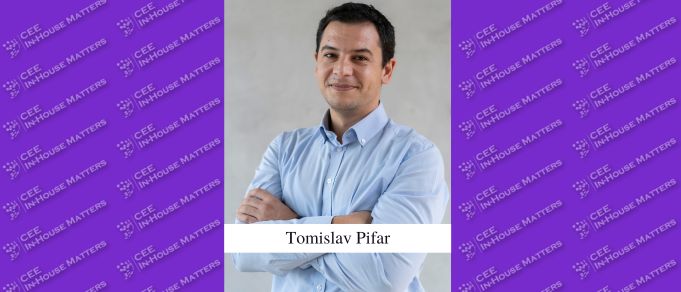Infobip General Counsel Tomislav Pifar first joined the company in 2011 and has been a witness to the company’s remarkable growth over the past 12 years. In reflecting on his journey, he explores the evolution of in-house legal work and international exposure, placing a particular emphasis on the transformative impact of AI on daily operations.
CEELM: Tell us a bit about yourself and your career path leading up to your current role.
Pifar: I spent the past 12 years at Infobip, and it has been quite an interesting ride. I initially joined the company as a young lawyer with brief prior experience at a small local law firm and at a public notary office.
The move to an in-house position turned out to be the start of a captivating phase – when I first joined, Infobip had a relatively modest global footprint, employing around 200 individuals. However, today, the company has a workforce of over 3,500 people spread across various continents. Being part of this remarkable growth has been a great experience.
CEELM: What were the initial impressions and experiences you encountered when transitioning to in-house legal work?
Pifar: Transitioning to the in-house world was a positive experience from the outset. I entered into an international exposure phase, engaging not only with local and regional matters but also interacting with colleagues across the globe, from Asia to Latin America. The ability to have conversations with colleagues worldwide within a single day was a pleasant surprise. Sure, handling multiple jurisdictions brought its challenges, but it was also part of the beauty of the job.
Additionally, one common element of in-house work is related to our ability to see and address problems from the very beginning and provides the opportunity to influence solutions more directly compared to external counsel.
CEELM: How large is your in-house team currently and how is it structured?
Pifar: Infobip’s in-house legal team is a global one – it comprises over 40 members strategically positioned on all continents. Our operational headquarters are in the UK and Croatia, with the latter serving as a centralized hub. Colleagues are stationed in North America, Asia Pacific, and other regions, each with a dedicated team supporting the respective business units. Acting as orchestrators, we collect local feedback and provide support to regional legal teams.
CEELM: What has kept your in-house team busy in the past year, and what are the priorities for the next year? What factors do you believe will have the most significant impact on your workload in the near future?
Pifar: The last 12 months have been marked by the exciting integration of AI into our daily operations – a major development with far-reaching impacts.
As a technology company, we’ve not only incorporated AI into our solutions but are also collaborating with AI engineering teams to customize tools for in-house legal teams. AI has the potential to significantly streamline our work, enabling faster and more optimized contract reviews and knowledge base management. Looking ahead, I believe AI will remain a focal point, with the team actively working on defining KPIs for the legal department, anticipating it to be a major driver in the coming period.
CEELM: How do you decide if you are outsourcing a project or using internal/in-house resources, and what factors play a role when it comes to choosing an external counsel?
Pifar: Our decision to outsource a project versus utilizing internal resources is dependent on several factors. In instances where we lack a presence in a specific market or specific in-house knowledge, outsourcing becomes an obvious viable option.
Referrals play a crucial role in our decision-making, alongside considerations of pricing and the flexibility offered by law firms regarding their pricing models. Nowadays, there are plenty of law firms with great expertise, but we prioritize relationships and the ability of external counsel to adapt to our specific needs and requirements.
CEELM: What do you foresee to be the main challenges for GCs in Croatia in the near/mid future?
Pifar: In the relatively small Croatian market, attracting top talent within the legal industry presents a unique set of challenges. Offering compelling work, competitive salaries, and fostering a positive work environment are essential aspects. Striking a balance between work-life considerations, particularly for younger professionals, and maintaining a collaborative environment are ongoing priorities. Being competitive in the market, both in terms of the work we offer and the collaborative global network we engage with, remains our strength.
Other than that, I believe that a new set of challenges for GCs globally and regionally is related to adapting to the changing landscape of legal technology, particularly how AI is reshaping the legal field. It has been an exciting but demanding aspect of our work. Looking ahead, AI remains a cornerstone of our strategy – the legal team is currently focused on defining KPIs for the legal department. This forward-looking approach positions us to leverage AI not only to assist our customers but also to enhance the capabilities of our in-house legal team.
The mix of law and technology also brings up worries about keeping data safe and private. Using AI means we’ve got to be extra careful with data, sorting through complicated rules and making sure we play by the standards. In a nutshell, the changing legal scene needs GCs to adapt and be flexible. Remaining aware of technological advancements, fostering a supportive work environment, and adeptly addressing complexities related to data are all crucial for the legal profession toward a resilient future.
This article was originally published in Issue 10.12 of the CEE Legal Matters Magazine. If you would like to receive a hard copy of the magazine, you can subscribe here.


